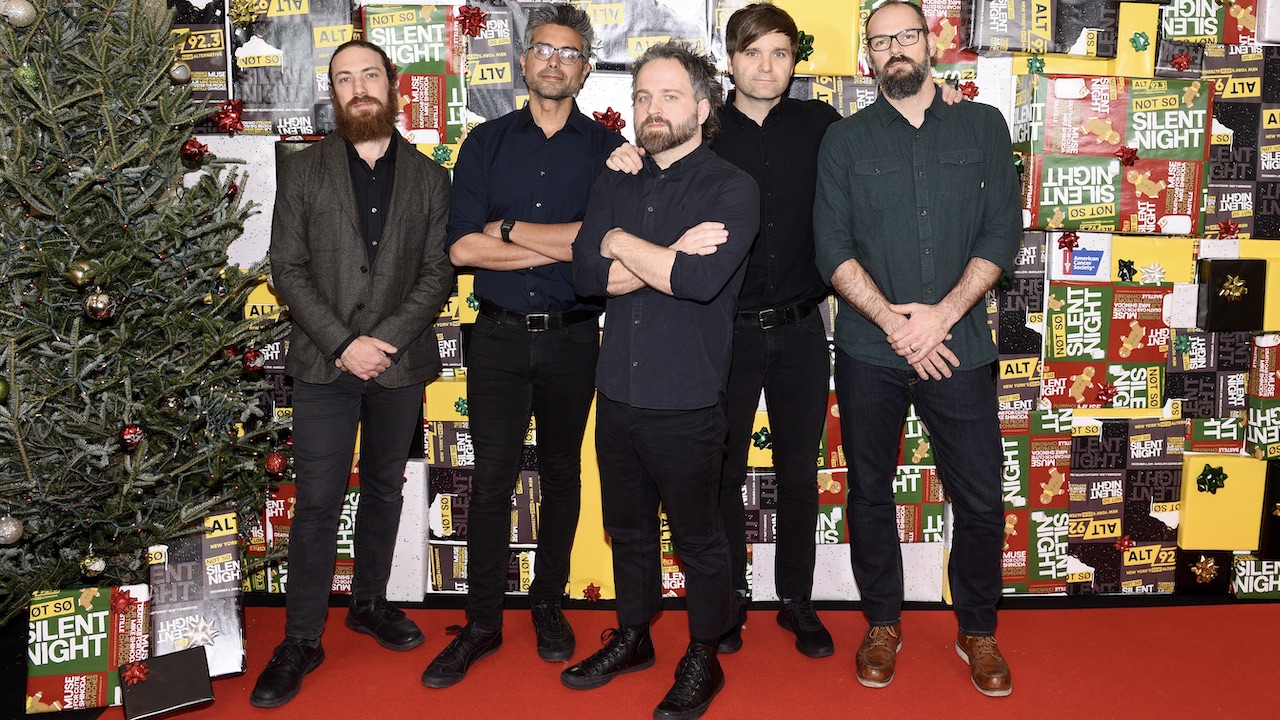
Over the last two and a half decades, few bands have had a firmer hold on indie culture than Death Cab for Cutie.
Formed in the mid-'90s in Bellingham, Washington, they’re an unlikely underground success story. Building a small - yet feverishly committed - following early on with their sharp-witted and often elaborate songs, they soon became poster boys for indie-rock stardom, assisted by a 2005 appearance on TV teen drama The O.C.
With a penchant for radio-friendly rock anthems that channel a distinct emotional vulnerability, frontman Ben Gibbard’s detailed, often dark lyricism led Death Cab for Cutie to be embraced by the emo scene, and it’s easy to see why. Driven by feeling, and mostly guided by Chris Walla’s intricate guitar work, Death Cab have made a name for themselves as not only one of indie rock’s most reliable exports but one of it’s most valuable: not many bands from their scene can co-headline two nights at New York's legendary Madison Square Garden, as they will (alongside The Postal Service) in September.
From their beginnings as a solo-project turned four-piece band, all thick-rimmed glasses and stark lyrical honesty, to their present five-piece incarnation, Gibbard's band have retained a desire to exploring new avenues in their ever-evolving sound, as evidenced by last year's Asphalt Meadows collection. Here's our guide to their 10 studio albums, from the so-so to the sublime.

10. Codes and Keys (2011)
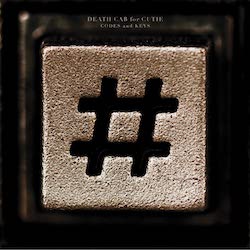
When your focus is firmly set on ceaselessly evolving in all you do, it's perhaps inevitable that some shots – no matter how well executed – just don’t quite hit the target. For many Death Cab for Cutie fans, that’s the story of the band’s seventh album, Codes And Keys.
A stark left-turn from 2008’s acclaimed Narrow Stairs towards a sonic style heavily influenced by Brian Eno, it’s their least guitar-centric album, and the last to feature original member Chris Walla (guitarist).
Written by Gibbard shortly after moving to Los Angeles, quitting drinking, and marrying actress Zooey Deschanel, a distinct feeling of change permeates Codes and Keys. Songs like Underneath the Sycamore and St. Peter’s Cathedral stand out as highlights, but Gibbard’s songwriting feels oddly unpersonal. Whether that's due to its slightly out-of-character optimism (tinged with a newly-wed glow), or the fact it followed one of the band’s darkest records to date, whilehints of the beloved Death Cab sound shine through on opener Home Is a Fire and melancholic love song Monday Morning, it all feels somewhat skewed.
That’s not to say that Codes and Keys is bad, and much of what it lacks in sheer impact, it makes up for in experimentation – evidenced with the success of the album’s biggest hit, the vibrant You Are a Tourist. A statement of the band’s admirable drive to reinvent themselves on every release, while it doesn’t sit amongst Death Cab’s hardest hitters, it’s a reminder of the mentality that got them to this point.
Buy Codes and Keys
9. Kintsugi (2015)
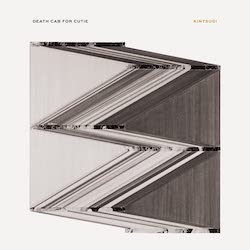
Between Codes and Keys and the release of the band’s eighth album in 2015, a lot changed in Death Cab World. Recorded following the finalisation of Gibbard and Deschanel’s 2012 divorce, and Chris Walla’s 2014 departure from the band after 17 years, Kintsugi presents a very different incarnation of its creators than its predecessor.
Named after a type of Japanese art involving fixing broken pottery, it’s a record not just shaded by heartbreak, but smothered in it. With Gibbard at one of his most emotionally vulnerable points, opener No Room in Frame is a poignant, heart-breaking ode to moving on, and a launch pad for further soul-baring on the album's second single The Ghosts of Beverly Drive, You’ve Haunted Me All My Life, and Little Wanderer.
This naked vulnerability can make for tough listening, but while Gibbard’s account of loss and grief here is deeply affecting, Kintsugi suffers from the impact of Chris Walla’s exit. An integral figure in the band up until that point, often juggling roles as a guitarist, songwriter, and producer, while Walla did contribute to the album before he packed his bags, his departure left his former bandmates swimming in the unknown.
8. Thank You for Today (2018)
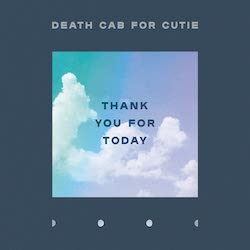
Reuniting with Kintsugi producer Rich Costey, Thank You for Today showed Death Cab for Cutie growing comfortable with the absence of Walla, and found Ben Gibbard's new look band waving goodbye to their past and gently embracing their future.
With new guitarist Dave Depper and keyboardist Zac Rae on board, the band’s ninth album brings a distinct stylistic switch-up. Perhaps the most understated effort in their catalogue, here the melodies are pushed to the forefront, with breezy pop hooks accompanying Gibbard’s laments on gentrification (Gold Rush) and bittersweet recollections (You Moved Away, Summer Years).
Written around the time that Gibbard celebrated his 40th birthday and marriage to photographer/tour manager Rachel Demy, Thank You for Today is a glistening slice of nostalgia, uncertainty, and reflection. With tracks like Your Hurricane recalling the perfectly-structured anthemic tendencies of the band’s 2005 breakthrough album, Plans, and closer 60 & Punk one of the finest songs in their career, this was Death Cab’s crowning moment of the 2010’s.
7. Narrow Stairs (2008)

After the breakthrough success of 2005’s Plans, Death Cab for Cutie were never going to be content to simply rest on their laurels: instead, on Narrow Stairs, their second album for Atlantic Records, they leaned into their darkest sound to date.
A haunting listen, accurately described by guitarist/producer Chris Walla as “polarizing” and “abrasive”, Narrow Stairs is unlike any other Death Cab album. Influenced by the experimental indie rock of Ohio band Brainiac, it’s equal parts explosive and meandering, with opener Bixby Canyon Bridge’s heavily distorted guitars and powerful drumming bleeding into an ominous crescendo that sets the tone going forward.
Fan favourite I Will Possess Your Heart provides a solid eight minutes of that same dark experimentation, with bassist Nick Harmer playing the same stirring bassline throughout as Gibbard croons the story of a stalker desperately trying to impress a girl. While Gin Blossoms-esque power-pop cut Cath… and No Sunlight dabble in some similar alternative rock territories to those previously explored, the slow-paced, creeping eeriness of Talking Bird and The Ice Is Getting Thinner draw Narrow Stairs back into its cloud of mystery, never quite settling into a solid groove.
While far from the most cohesive in Death Cab’s arsenal, Narrow Stairs is a raw exploration of darkness, and a brilliant contrast to the polished pleasantries of Plans.
Buy Narrow Stairs
6. Asphalt Meadows (2022)

Mostly written remotely over the course of 2020 and 2021 whilst the pandemic put the world on hold, Death Cab for Cutie’s tenth (and latest) album is defined by anxiety, introspection, and experimentation.
With the creative freedom afforded by global lockdowns, Asphalt Meadows sees the band expand on its signature sound with a refreshed urgency. Merging the experimentation and discovery of their previous three collections with the romanticised melancholia and energy of their breakthrough sound, with album ten Death Cab delivered a statement of rejuvenation.
That statement is largely driven by Gibbard’s utterly revitalised songwriting. Whether he’s grappling with his pandemic anxieties on jaunty opening track I Don’t Know How I Survive, pondering the passage of time and the concept of religion on Here to Forever, or exploring the regret and missed opportunities that litter life’s journey on pensive spoken word cut Foxglove Through the Clearcut, despite the uncertainty projected in the frontman’s words each moment somehow feels laced with a newfound clarity.
Balancing musical maturity and dreamy storytelling, Asphalt Meadows is a triumphant return to form from the Washington indie veterans.
Buy Asphalt Meadows
5. Something About Airplanes (1998)
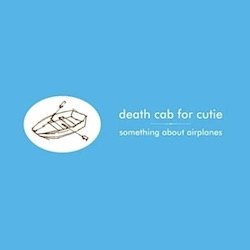
When Ben Gibbard released a demo cassette titled You Can Play These Songs with Chords as a solo project under the name Death Cab For Cutie in 1997, he hadn’t envisioned forming a band. However, after word of the musician’s songwriting talents swept through the local scene, soon enough he found himself in his basement recording with guitarist Chris Walla (who had worked on the demo), bassist Nick Harmer, and drummer Nathan Good.
This is where the story of Death Cab officially begins, and for a debut album from a young, underground indie band still learning the ropes, Something About Airplanes, is nothing short of a masterpiece.
An album written by a group of 21-year-olds, produced by the band’s own guitarist, on paper it appears to conform to the beginnings of every scrappy local DIY band, but from day one Death Cab were onto something special. Refusing to simply blend into the largely standardised indie-rock scene led by the likes of Built to Spill and Modest Mouse throughout the mid-to-late 90’s, it’s a debut album with a remarkable eye for innovation, offering an impressive display of musical talent.
Coloured by longing, loss, and grief, there’s an unparalleled maturity to Gibbard’s songwriting, with his intricate wordplay and distorted vocals taking centre stage. Elsewhere, Walla’s reverb-heavy guitar work shines, and the rhythm section seems almost impossibly comfortable for a debut effort. From the dizzying slowcore drone of Sleep Spent to the insatiable grunge energy of Amputations, here Death Cab showcased the versatility that would go on to propel them to indie stardom.
Standing as an indie rock gem in its own right whilst hinting at the impeccable musicianship waiting to fully blossom from the group, Something About Airplanes transcends nostalgia to earn its place among the best of Death Cab.
Buy Something About Airplanes
4. The Photo Album (2001)
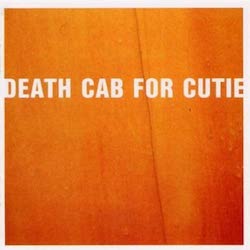
Coming just one year after 2000’s We Have the Facts and We’re Voting Yes, The Photo Album is an album documenting a band in transition. Moving from the Pacific Northwestern sound that inspired much of their first two efforts, on album three Death Cab began to shift towards something bigger, toying with the sound that would come to fruition fully on 2003’s Transatlanticism.
As the name suggests, The Photo Album presents a series of vignette snapshots covering life, loss, love, and letting go. Weaving vivid observations into wonderfully crafted pop songs that feel beautifully simple, it’s a sub-40-minute journey into the depths of Gibbard’s mind, helped along by melancholic piano lines and intelligent, heartfelt songwriting.
The spiteful Styrofoam Plates tells the story of the funeral of an absent father, Why You’d Want to Live Here is an upbeat tongue-in-cheek ode to Los Angeles, and We Laugh Indoors recounts the tale of an unfaithful relationship. The album’s crowning moment comes with the twinkly guitar lines of A Movie Script Ending, which brought the band some breakout success after featuring on The O.C.
The Photo Album offers the first real glimpses of Death Cab’s universal appeal, retaining the layered musical complexity that defined their early sound within infectious, heart-on-sleeve songs that captured the hearts of anxious teens across the world.
3. Plans (2005)
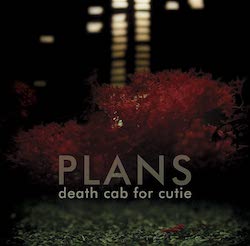
After parting ways with long-term label Barsuk in 2004 following the success of Transatlanticism, Death Cab for Cutie’s fifth album is also their major label debut (on Atlantic Records)... and it shows.
Though the band had arguably been ready to make the major label leap for some time, by 2005 they had a firm grasp of their sound, and Plans is polished in all the right places. Dialling up the cinematics on tracks like Your Heart Is an Empty Room, with its layers of chiming, atmospheric guitars, and reeling it in for the likes of I Will Follow You into the Dark, where Gibbard’s softly sung poetry of romantic morbidity and delicate guitar lines are given space to flourish.
Recorded in a secluded rural farmhouse studio in Massachusetts, an air of contemplation encircles each track in a way that only such isolation could inspire. Coming shortly after the success of The Postal Service’s Sub Pop Records’ 2003 debut album, Give Up - The Postal Service being an electronic duo comprised of Gibbard and LA-based musician Jimmy Tamborello - Plans leaned further into similar pop influences than Death Cab’s predecessor.
Though some fans have criticised the album for its lack of urgency, the band’s major label debut truly benefits from an intricate balance of grandiosity and intimacy. Crooked Teeth and Soul Meets Body somehow feel like huge, sweeping indie rock songs and light, mellow cuts at once, whilst Different Names for the Same Thing transforms from a graceful rock cut into a flurry of soft synths.
The album’s true highpoint however comes in its final 15 minutes, with a trio of the band’s most emotional tracks to date. The piano-led What Sarah Said presents Gibbard studying the concept of death within a series of sharp observations, Brothers on a Hotel Bed dons a reflective melancholy over mournful piano melodies, and Stable Song serves as a companion piece to 2001’s A Movie Script Ending.
2. We Have the Facts and We’re Voting Yes (2000)
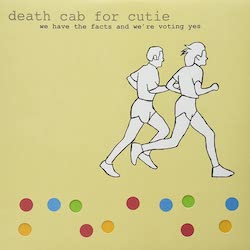
Taking all the brilliance of their debut and dialling up the maturity and polish, Death Cab for Cutie’s second album isn’t a giant leap forwards from 1998’s Something About Airplanes, but it’s a cleverly calculated progression.
Opening song Title Track kicks off affairs where the band left off two years prior, with Gibbard’s voice transitioning from its previous distorted form to a more fragile croon as he laments in Kerouac style. It’s that fragility that defines We Have the Facts and We’re Voting Yes, and whilst upbeat cuts Company Calls and Lowell, MA offer fleeting breaks from the melancholy, this is an album of hushed tones and creeping darkness.
Recorded at the band members’ parents’ homes on a borrowed 16-track half-inch tape recorder with Gibbard on drums for the bulk of the album following founding drummer Nathan Good’s departure in 1999, the vocal performance on The Employment Pages is impressively tender. Elsewhere, the gentle glockenspiel chimes and bells on No Joy in Mudville establish the band’s penchant for sonic nuance, and the spindly guitars of Company Calls Epilogue set the tone for Walla and Gibbard’s unorthodox playing.
Documenting Gibbard’s feelings about entering adulthood, what makes the band’s second album so special is the fact that it feels like a journey. Having carved out their trademark style on their debut, by album two Gibbard and co. were ramping up their nostalgia, yearning, and confusion to provide a wonderous snapshot of youth, riddled with intricacies that feel equally melancholic and euphoric.
At a time when Saddle Creek Records were fostering their own take on the emo sound with artists such as Bright Eyes and Cursive, We Have the Facts and We’re Voting Yes takes the unique emotional rawness of the band’s debut and refines it into something altogether more enticing, setting Death Cab up for their crowning moment in early 2000s.
Buy We Have the Facts and We’re Voting Yes
1. Transatlanticism (2003)
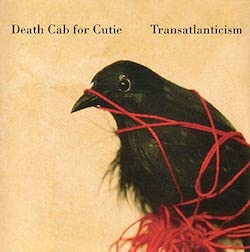
After 2001’s The Photo Album, Death Cab For Cutie had somewhat settled into a musical niche. Distancing themselves from the distorted heavy rock that their peers were favouring in the early 2000s, instead the four-piece found themselves drawn to emotion. Whether it was in the guitar lines, the piano, or the lyricism, emotion had become integral to the Death Cab sound, and on their fourth album they showcased feelings in a way few before them had managed.
Centred around the pain of maintaining a long distance relationship, Transatlanticism has a thematic narrative that allows Death Cab For Cutie to thrive. Open and unguarded, Gibbard’s songwriting is served up with an emotional and musical eloquence that far surpassed any of the band’s pervious work and would go on to be scrawled across the diary pages of countless heartsick teens.
With Chris Walla expanding his scope and ambition as a producer alongside Gibbard’s developing songwriting, Transatlanticism is nothing short of indulgent. Opener The New Year is an explosively warm yet distinctly uncertain welcome, Title and Registration pairs repressed feelings and unwelcome reminders with a xylophone arrangement, and the thrashing We Looked Like Giants recalls lustful moments and painful memories with remorse.
The album’s defining moment however comes in its title track, an eight-minute gradually-building ode to love felt over geographical distance. As sparse piano lines transform into a flurry of cymbals accompanied by a simple guitar line, Gibbard’s sorrowful repetition of the beautifully direct line: “I need you so much closer” is as heart-breaking as it gets, yet there’s a sense of hope as the song draws to a close.
What’s most affecting about Transatlanticism is that it’s undoubtedly human. It bathes in melancholy without feeling inherently pessimistic, and it captures glimpses of grandeur without seeming overly romanticised. An album of unwavering vulnerability that skyrocketed Death Cab into millions of uncertain, awkward teenage hearts – and continues to do so even two decades on - each of its eleven songs feels like a chapter in a novel so intimate you shouldn’t be reading - but you can’t tear your eyes away.
Buy Transatlanticism







